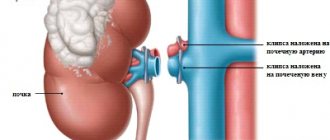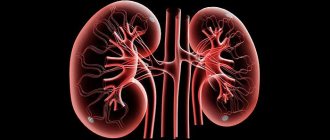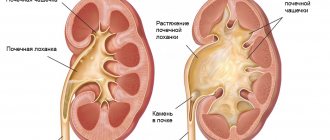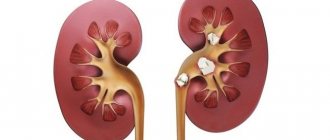The disease occurs from pathologies, as a result of which the kidney ceases to function normally. This leads to poisoning of the body and death. To prevent this from happening, it is necessary to replace the affected kidney with another, artificial or donor, kidney.
Kidney transplantation is a common procedure, although about 50 years ago a person whose kidney failed was considered a death row. Today this problem is solved quickly and effectively. It is possible to replace the affected organ with an artificial kidney, but the person will not be able to leave the dialysis center for a long time.
Kidney transplant is a common procedure today.
Another thing is transplantation of a kidney taken from another person. Thanks to this procedure, the patient’s life will become normal again and will last 15 years longer. But the disadvantage of kidney transplantation is the high cost of the procedure, which ranges from $20,000.
Kidney transplant from related and unrelated donor
Kidney transplantation is possible from either a related or unrelated donor, but each country where organ transplantation is available has its own rules.
In European clinics, kidneys are transplanted from first-generation relatives. Israeli medical centers perform transplantations from third generation relatives. Turkish hospitals transplant an organ from a third-generation relative or close friend. In this case, both parties provide documents that confirm the possibility of surgical intervention.
It is important that organ donation is carried out only free of charge. Any attempts to buy or sell organs are subject to criminal liability. Only expenses associated with the operation are paid - diagnosis, intervention, hospitalization.
Contraindications
There are many of them in kidney transplantation. These include:
- active malignant neoplasms;
- infectious diseases that cannot be treated;
- tuberculosis (active or cured less than a year ago;
- hypertonic disease;
- stomach ulcer (during decompensation);
- HIV infection;
- heart failure;
- drug addiction and alcoholism.
Cancers that have not had a recurrence are not a contraindication. From the moment of recovery, 2 to 5 years should pass (depending on which organ was sick). Nowadays, diabetes is not a contraindication.
How to prepare for a kidney transplant surgery?
The process of preparing for the intervention includes a physical examination of the patient, CT/MRI, laboratory tests of blood and urine, as well as a psychological assessment of the condition. Next, the team of doctors discusses the results and also determines whether the patient meets the criteria for surgery. The next step is to find a suitable donor and examine him. Specialists take into account the age, general health of the patient and the donor, as well as the size of the donor organ. Doctors also conduct compatibility tests:
- blood typing
- helps determine the appropriate blood type, which subsequently reduces the risk of organ rejection;
tissue typing (HLA)
- is carried out to search for HLA antigens in a potential donor, to which the recipient has antibodies, or to predict their appearance after transplantation;
crossmatch test
- helps determine the compatibility of the recipient with the donor organ by mixing blood samples from the donor and recipient. The test determines whether antibodies in the patient's blood will react to specific antigens in the donor's blood. A negative cross-match means they are compatible and rejection is unlikely.
How is a kidney transplant performed?
Organ transplantation takes place under general anesthesia. The patient's condition is constantly monitored by the surgical team. Throughout the intervention, specialists monitor heart rate, blood pressure and oxygen levels in the blood.
To access the organ, foreign surgeons most often use laparoscopic instruments. Thanks to this approach, the incision is smaller, and the rehabilitation period after the intervention is correspondingly reduced. During the operation, the surgeon makes an incision in the abdominal cavity (just above the groin).
Next, the donor organ is placed in the patient's body, blood vessels are attached to the recipient's renal vessels, and the ureter is connected to the bladder. Most often, the recipient's kidneys are kept, so the donor organ is transplanted third. The diseased kidney is removed only in the case of severe infection, cancer, as well as atrophy or polycystic disease.
How long does a kidney transplant operation take?
Kidney transplantation takes about 3-4 hours.
Search for new treatments
Research into the problem of renal failure, the reaction of the body and the implanted organ, and the development of complications continues. I. I. Mechnikov, in his studies of phagocytes, once discovered that in many internal organs, during the aging process, cells are replaced by connective tissue. Nephrons in renal failure are also replaced by it. It is synthesized from phagocytes. Phagocytes capture and absorb, absorb solid particles and harmful microorganisms, and remove them from the body. They are part of the immune system, a source of disease at the same time. They create connective tissue using collagens. A high content of this protein in the urine is one of the signs of kidney failure.
The membranes of the internal organs, the so-called storm, are made of connective tissue, ensuring their shape and integrity. Connective tissue is needed for the formation and restoration of ligaments, tendons, cartilage, bones, and blood vessels. Scars are made of it. Collagenesis is a whole complex of diseases of different etiologies associated with connective tissue pathology. These are congenital and acquired health problems. Renal failure is not classified as collagenosis, but is associated with a number of pathologies, as is the phenomenon of premature aging of organs, the body, the outer skin, and the appearance of wrinkles. It is obvious that the replacement of nephrons with connective tissue is a process similar to aging.
How is the recovery period after a kidney transplant?
After the intervention, the patient spends several days in the intensive care unit. There he is under round-the-clock supervision by doctors and junior medical staff. After the condition has stabilized, the person is transferred to a regular ward.
The functions of the new kidney start immediately or after a few days. In the second case, temporary dialysis may be necessary to allow the organ to work properly.
During rehabilitation, the patient may also feel discomfort at the incision site, but these sensations pass fairly quickly. In the first 6 weeks, it is not recommended to engage in active sports or lift heavy objects - it is important to wait until the incision is completely healed. The patient can return to normal life approximately 7-8 weeks after surgery. Once a person leaves the hospital, monitoring of his condition does not end. The first few weeks after discharge, the patient must come for an examination and have a blood test. These measures help doctors adjust the drug regimen against kidney rejection.
Because the patient takes medications that prevent the donor kidney from being rejected, the body becomes more vulnerable to infections. To do this, the doctor may prescribe additional medications (antibacterial, antiviral, etc.) that will reduce the risk of concomitant diseases.
The problem of rejection
The risk of donor organ rejection haunts the patient, even if the kidney is from a relative. At the immune level, nature provides for the elimination of foreign bodies, for which the body produces antibodies. Most often, complications appear within 3-4 months.
In order to promptly respond to kidney rejection, you need to carefully look at your body so as not to miss alarming symptoms: high fever, pain, problems with urination, tests indicating the return of kidney diseases.
Where to get a kidney transplant?
Kidney transplantation is carried out in many medical centers around the world, but some of them have achieved great success in this difficult process. The Medical Park Antalya Clinic has a team of specialists led by Dr. Alper Demirbaş. Doctors have performed more than 5,000 kidney transplants, and the 5-year patient survival rate is 95%.
Another world-famous specialist, Murat Tuncer, practices at the Medicana clinic. The survival rate of patients operated by the doctor reaches 99%. In addition, he led a unique cross-kidney transplantation operation. The process involved 7 recipients and 7 donors. The medical team consisted of more than 20 doctors and 20 nurses. In addition to the Medical Park and Medicana clinics, kidney transplantation is performed in:
- Quiron Salud hospital network (Spain); Suncheonghyang Hospital (South Korea); Livi Clinic Koç University Hospital (Türkiye);
- Vienna Private Clinic (Austria); medical centers Assutai Ichilov (Israel); network of clinics Asklepios (Germany).
Summary
The need for a kidney transplant appears in cases where the organ ceases to perform a filtering function.
In addition to end-stage renal failure, indications for transplantation include kidney injury, polycystic disease, congenital pathologies, nephropathy and pyelonephritis. Kidney transplantation is possible from either a related or unrelated donor, but each country where organ transplantation is available has its own rules. In European clinics, kidneys are transplanted from first-generation relatives. Israeli medical centers perform transplantations from third generation relatives. Turkish hospitals transplant an organ from a third-generation relative or close friend. Organ donation is carried out only free of charge. Any attempts to buy or sell organs are subject to criminal liability. The process of preparing for the intervention includes a physical examination of the patient, CT/MRI, laboratory tests of blood and urine, psychological assessment of the condition, blood and tissue typing, and crossmatch test. Abroad, transplantation is most often performed laparoscopically. This approach makes it possible to reduce the incision and the duration of rehabilitation for both the donor and the recipient. Kidney transplantation takes about 3-4 hours. In the first year after transplantation, the survival rate of the donor organ is 98%. The five-year survival rate is more than 86%. You can undergo a kidney transplant at Liv Hospital, Medical Park, Sunchonghyang, Medicana, Kiron Salud hospitals, as well as at Koch and Asklepios clinics. If you need help in choosing a clinic that performs kidney transplants, leave a request through the “Get a free consultation” button. The MediGlobus coordinator doctor will contact you as soon as possible, provide a free consultation and select a clinic based on your needs and expectations.
Transplantology
Vadim Berezhnoi (MD)
General practitioner, Medical expert, Head of the department of doctors-coordinators.
Ekaterina Sibira
Completed an in-depth course in copywriting and content marketing. Since 2019 he has been working in the field of medical tourism. He follows innovations in medicine and is interested in the latest developments in endoscopic surgery. In addition to writing articles, he creates video content for the YouTube channel MediGlobus, and also attends conferences on medical tourism.











